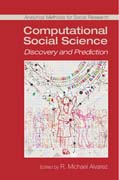
Quantitative research in social science research is changing rapidly. Researchers have vast and complex arrays of data with which to work: we have incredible tools to sift through the data and recognize patterns in that data; there are now many sophisticated models that we can use to make sense of those patterns; and we have extremely powerful computational systems that help us accomplish these tasks quickly. This book focuses on some of the extraordinary work being conducted in computational social science - in academia, government, and the private sector - while highlighting current trends, challenges, and new directions. Thus, Computational Social Science showcases the innovative methodological tools being developed and applied by leading researchers in this new field. The book shows how academics and the private sector are using many of these tools to solve problems in social science and public policy. INDICE: Preface Gary King; Introduction R. Michael Alvarez; Part I. Computation Social Science Tools: 1. The application of big data in surveys to the study of public opinion, elections, and representation Christopher Warshaw; 2. Navigating the local modes of big data: the case of topic models Margaret Roberts, Brandon Stewart and Dustin Tingley; 3. Generating political event data in near real time: opportunities and challenges John Beieler, Patrick T. Brandt, Andrew Halterman, Philip A. Schrodt and Erin M. Simpson; 4. Network structure and social outcomes: network analysis for social science Betsy Sinclair; 5. Ideological salience in multiple dimensions Peter Foley; 6. Random forest applied to feature selection in biomedical research Daniel Conn and Christina Ramirez; Part II. Computation Social Science Applications: 7. Big data, social media, and protest: foundations for a research agenda Joshua Tucker, Jonathan Nagler, Megan Metzger, Pablo Barbera, Duncan Penfold-Brown, John Jost and Richard Bonneau; 8. Measuring representational style in the House: the Tea Party, Obama and legislators' changing expressed priorities Justin Grimmer; 9. Using social marketing and data science to make government smarter Brian Griepentrog, Sean Marsh, Sidney Carl Turner and Sarah Evans; 10. Using machine algorithms to detect election fraud Ines Levin, Julia Pomares and R. Michael Alvarez; 11. Centralized analysis of local data, with dollars and lives on the line: lessons from the home radon experience Phillip N. Price and Andrew Gelman; 12. Computational social science: towards a collaborative future Hanna Wallach.
- ISBN: 978-1-107-51841-4
- Editorial: Cambridge University Press
- Encuadernacion: Rústica
- Páginas: 337
- Fecha Publicación: 07/03/2016
- Nº Volúmenes: 1
- Idioma: Inglés
